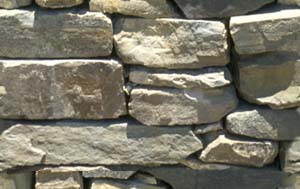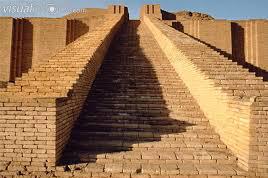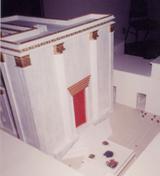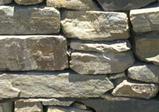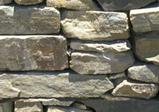Fears of war and economic disaster are all around us. But we’ve only seen tremors compared to the upheavals that are prophesied for the coming years. Don't expect things to settle back to normal; prepare for changes like you’ve never seen before. But there's no reason to fear if our anchor is in the right place. “In the time of trouble He will hide me in His protected place.” (Psalm 27:5) So the question is whether we are in that protected place.
Yeshua the Messiah told us:
"Whoever comes to me and pays attention to my words and carries them out...is like a man who built a house [with its] foundation on a rock, and a flood came and the torrent beat violently against that house, but could not shake it, because it had a stable foundation on a rock." (Luke 6:47-48)
He said the opposite would happen to a man who built his house on sand.
So what are these words of His that we need to carry out? When someone asked Him how to inherit eternal life, Yeshua told him to keep the commandments. (Luke 18:18-20) He also said the way to prove we love Him is to "keep my commandments." (John 14:15) His commandments do not differ from those his Father, YHWH, had given through Moses. (John 5:19, 30; 10:30)
That seems simple, doesn't it? Yeshua made it clear that none of His Father's expectations had changed. (Matt. 5:17-19) Yet men have muddied the issue by saying that since He paid for our sins and has given us a grace period, we no longer need to obey Yahweh's commandments (called the Torah, which means "instruction"). They are portrayed as legalism or in opposition to grace. But let's examine why this is not true.
YHWH's desire in creating humanity was to dwell with us. He visited Adam and Eve daily in Eden and held conversations with them. When they forfeited this intimacy, Yahweh "subjected the whole creation to vanity in hope [of being] freed from the slavery to corruption into the glorious freedom of the children of Yahweh" (Romans 8:20) Meanwhile He imposed vicious cycles of laboring and getting nowhere (the theme of Ecclesiastes) to set the stage. But mankind became impatient and tried to unite at the Tower of Babel and break free from YHWH's "oppressive" limits and “make a name for themselves”. (Gen. 11:4) So He placed further restrictions on men as a deterrent to this taking place again, since this was not yet "the place of our rest".
In contrast, Abraham was called out from that culture and given the promise that YHWH would instead make a name for him. He began a counter-history that would be called Israel--an alternative to all being “vanity of vanities”, like the law of aerodynamics, which supersedes the law of gravity while the latter remains intact too.
Before the curse had left His lips, He had set limits on how far it could go. The Sabbath day kept us from total enslavement to the sweat of our brow. The path to liberation took a more concrete form in the Torah. Its particular commands show us how to overcome many of the effects of Adam's fall in our daily lives. It is a taste of Eden in the midst of our fallen condition. Far from being legalism, the Torah itself is grace--a supernatural provision to overcome our separation from Yahweh and our tendency to sin. He set up the Tabernacle (then the Temple followed its pattern) as a picture of how He desires to dwell among us. Its rituals illustrate the cleansing from sin and holiness we need to walk in if He is to be able to do so. This was the prototype of the House Built on a Rock.
Meanwhile, after Babel, the rebels had gone underground, led by Nimrod (Gen. 10). He was executed by a righteous man, causing great lamentation among his followers. But then his wife, Semiramis, revealed that she was pregnant, and claimed her son was a reincarnation of Nimrod. He was memorialized in mythologies around the world under dozens of names (such as Osiris, Tammuz, Mithras, Bacchus, and Adonis), and paganism--a counterfeit "temple"--was born: the House Built on Sand.
Nebuchadnezzar’s dream of a statue made of various metals (Daniel 2:31ff) shows how it developed. Babylon (the Greek name for "Babel") is the head. Thus “mystery Babylon”, which shows up over and over in Scripture, is indeed a continuation of this theme that began with Nimrod’s Tower of Babel. It is the mother of pagan worship all over the world.
This "dynasty" continues through the Persian, Greek, and Roman Empires. Then Rome blends into the “feet of clay”--the weakness that finally allows it to be toppled by a kingdom that will never fall.
But there was a wrinkle. Though Israel was given a lifestyle meant to demonstrate to all the tremendous wisdom Yahweh offered to any who would side with Him, it became sidetracked and divided in two. The northern portion, called the "House of Israel" (vis-a-vis Judah) left Yahweh's covenant, preferring the pagan system, mixed with the Gentiles (Hos. 8:8) and essentially becoming part of the "other house".
The framework for our liberation became complete when Yeshua perfectly kept the Torah and triumphed over death. The way into the sanctuary was reopened, and a "new man" began to be restored, who would form the dwelling place Adam had failed to maintain. (1 Cor. 15:45-47) Yeshua is called its "head" and made it possible for us to become a part of this "restored Adam". But it could not be complete without the other part of Israel. Many prophets had said YHWH would preserve a remnant until it could be brought back into the Covenant, and this was one of the Messiah's jobs (Isaiah 49:6). He did in fact say He had come "only for the lost sheep of the House of Israel" (Matt. 15:24), and sent His disciples out to finish the job of finding and bringing them back.
The apostles did get busy trying to unite the northern kingdom and Judah into one house. (Rom. 14:19) But Emperor Constantine resuscitated the pagan empire by granting Gentile believers a legitimacy of their own, and the Kingdom was divided once again. As Daniel had said, this fourth kingdom (Rome) "had the idea to change the times and seasons", replacing Yahweh's calendar with a pagan one. To hide its true agenda, paganism adopted a veneer of Christian terminology, and forged an alliance that parallels the iron mixed with clay in the statue’s toes. Baal’s (Mithras’, Saturn’s, Nimrod's)
birthday was now called “Christ’s”. Ishtar’s festival (Easter) was merged with the commemoration of the resurrection, since it sometimes coincides.
Who was being glorified by this? Certainly not the true Yeshua! So the church was now inadvertently strengthening the wrong house --or building a pagan house on the pure foundation Yeshua laid (1 Cor. 3:11), instead of a holy dwelling place for Yahweh. The Reformation set this back somewhat, but did not go far enough.
The Northern Kingdom had been punished by being scattered among all nations (Hos. 1:4-11). In Hebrew, "scattered" can also mean “sown”. Yeshua predicted this: an enemy comes along after the field is seeded and adds darnel, a plant that can't be distinguished from wheat until both come to maturity, when it produces a bitter yield. (Matt. 13:28) This is a picture of the now-hybrid church: part Israelite and part-pagan. Yet many are awaking to the fact that the Torah forbids such mixtures (Lev. 19:19), and the house we
were meant to be building is Israel.
After 20 years of serving his pagan uncle, Jacob realized he was really strengthening another's household, not his own. Our "benefactor", too, is proving only to want to get rich at our expense. The “image of the Beast” turns out to be only a projection of Satan’s wishful thinking. To survive, it must feed off Yahweh's real idea as a parasite. Its true colors show up when it turns on the church that prostitutes itself with it (Rev. 17:16) by becoming subservient to society's goals.
It is seldom blatantly wicked. The Gospel--the proclamation that there is complete amnesty for the Northern Kingdom if we repent, and that others may join Israel--has been co-opted and watered down to “God loves everyone, whether they obey Him or not.”This generic "God" is used of anyone from Yahweh to Allah--another way many will be deceived into thinking they are building the right house. (Mark 13:22) The only way to recognize subtle differences is to become intimately acquainted with the real thing--the
commands and teachings that Yahweh actually gave.
Of this counterfeit Messiah, Daniel says, “By peace he will destroy many.” And indeed, everywhere we hear cries for "peace" and “universal brotherhood”. The Holy Roman Empire was one of many attempts to rebuild Babel. Many who no longer know Scripture well enough to see any reason for the rift are heeding Rome’s invitation to take advantage of her amnesty and rejoin the “mother church”. She is making bold overtures to every other religion to join the unification, too.
Israel is not to be counted among the nations (Num. 23:9; Jer. 10:2)--i.e., not part of this coalition. We're tempted to compromise to ensure our security. But Yahweh can provide manna now as easily as He did before. We can't resist this pressure alone. Yahweh wants not just a relationship with individuals, but a "people" He can dwell among. In building Him a Temple, we also build a "sheepfold" for each other. The house He wants to dwell in is made up of those "who believe and are zealous for the Torah" (Acts 21:20), who both “keep the commandments of Elohim and have the testimony of Yeshua the Messiah.” (Rev. 12:17) He'll let even a foreigner be part of it if he keeps His Sabbath (Isa. 56:3-8)--not a substitute day.
YHWH overlooks our ignorance, but now that we know better, it's time to repent and leave these mixtures behind. (Acts 17:30) He still considers eating pork, etc., an abomination. (Isaiah 66:17) To those who keep funding the holidays that the House on Sand feeds off, “who set a table to Fortune/Luck [Gad] and who fill a cup with mixed wine for Fate/Destiny [December 24 and 25]", Yahweh says, "I will number you for the sword." (Isa. 65:11ff). Soon our only choice will be to side with either Babylon or Jerusalem. One will soon be all evil, the other all holy. (Rev. 22:11) Anyone associated with Babylon at that point will be judged along with her. Our motives may be impeccable, but we'll be found to be building the wrong house--the one built on sand.
So there are the tests; which are you building? Your practices prove which it is.
Daniel recognized when the time of his exile was due to be up. While others were comfortable in the luxury of Babylon, he took steps to in fact bring the exile to an end. Yahweh had reasons for our exile too, but now it is nearly over. It's time to "come out of her, My people” (Rev. 18:4) and, now that it is possible, be the Temple we were truly meant to be.
Are You Building the Right House?


